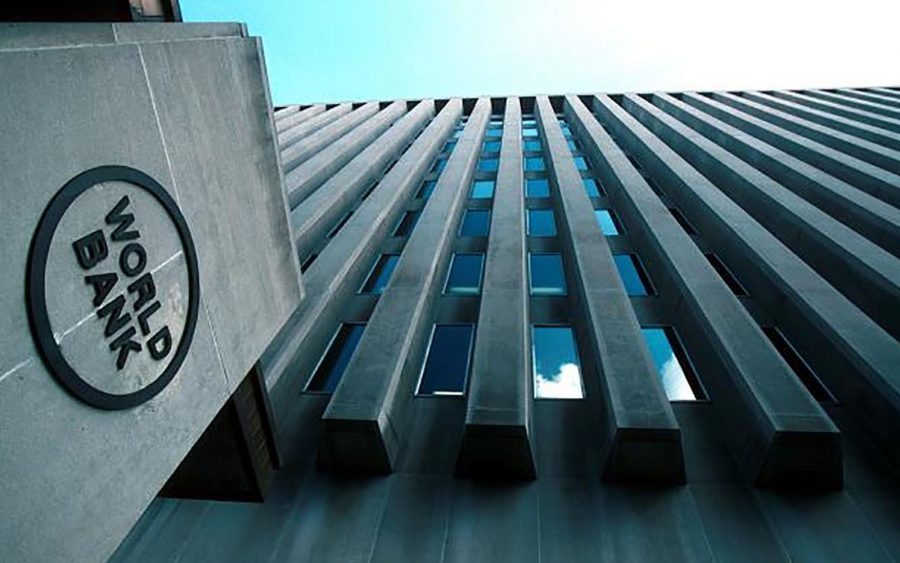…As Nigeria takes backstage with oil powered monoeconomy at 2.1%
More facts have continued to emerge from the World Bank’s latest ‘Africa’s Pulse’, the bank’s bi-annual analysis of the state of African economies, released earlier this week.
Whereas the World Bank lowered its forecast for Nigeria’s economic growth in 2019 to 2.1 percent, citing stagnant oil production, high inflation and policy distortions, the bank predicted that Ghana’s economic growth will be 7.6 per cent for 2019 as compared to government’s projection of 7.2 per cent.
Business Hilights Ghana Bureau chief reports that during a press briefing on the release of the April 2019 ‘Africa Pulse’ report in Accra, Kwabena Gyan Kwakye, Country Economist at the World Bank Office in Accra said, “So we are projecting 7.6 per cent for 2019, it’s a little above government’s projection of 7.2 per cent. So basically we have oil production as the main driver, mining also, because in 2018 mining picked up and we expect that it will continue to do so in 2019, of course non oil production.”
According to the report, economies like Ghana, Kenya, Rwanda, Uganda, Cote d’Ivoire are powering Africa’s growth from above 6 per cent.
World Bank recalled that solid economic growth was recorded in 2018 in Ghana, Kenya, Rwanda, Uganda, Tanzania, and several economies in the West African Economic and Monetary Union (WAEMU) the report said. Ghana’s growth was largely due to momentum in the expansion of manufacturing and services, it added.
On the demand side, the report indicated that, PMI readings softened in the first quarter of 2019 across several countries including Ghana, pointing to a slowdown in the pace of expansion of private sector activity.
However, the three largest economies on the continent, Angola, Nigeria and South Africa continue to have sluggish growth for the World Bank’s growth projections.
Whereas the International Monetary Fund (IMF) in its new report upgraded its growth rate forecast for Nigeria’s Gross Domestic Product (GDP) in 2019 to 2.3 percent, while retaining 2.1 percent for 2018, citing improved crude oil prices, World Bank noted that the its 2.1% forecast on Nigeria only represents 0.1 percentage point lower than the 2.2 percent forecast made by the bank last year October.
According to the report on Nigeria, “Growth in Nigeria is projected to rise from 1.9 percent in 2018 to 2.1 percent in 2019 (0.1 percentage point lower than last October’s forecast). This modest expansion reflects stagnant oil production, as regulatory uncertainty limits investment in the oil sector, while non-oil economic activity is held back by high inflation, policy distortions, and infrastructure constraints. Growth is projected to rise slightly to 2.2 percent in 2020 and reach 2.4 percent in 2021, as improving financing conditions help boost investment.”
The World Bank also lowered its growth estimates for Sub-Saharan Africa 2.8 percent in 2019 and 3.3 percent in 2020, citing slower growth in Nigeria, Angola and South Africa.
The report said: “Growth in Sub-Saharan Africa is forecast to recover to 2.8 percent in 2019 from the slowdown to 2.3 percent in 2018 and rise to 3.3 percent in 2020.
This upturn is supported, on the demand side, by exports and private consumption and, on the supply side, by a rebound in agriculture, an increase in mining production, and steady growth in the services sector in some countries. These forecasts are 0.5 and 0.3 percentage points lower than last October’s forecasts, respectively, reflecting slower growth in Nigeria and Angola, due to challenges in the oil sector, and subdued investment growth in South Africa, due to low business confidence.
On the other hand, the continent’s economic growth has been lower than the population growth in four consecutive years.
World Bank further averred that “This slower than expected growth comes from both global and domestic factors. Globally, there are two very important factors that are driving our growth projections and estimates down. First is growing protections that have led to growing protectionism in some of Africa’s largest trading publics.
“The second important factor is that, although commodity prices have recover, they remain uncertain and volatile and therefore having a severe negative impact on African economies,” Albert Zeufack, World Bank Chief Economist for Africa said.
The report also indicated growing fragility is a major cause of stagnating development in Africa. It explained that fragile situations include countries and territories where policies and institutions are weak and not functioning well enough to secure peace and stability and deliver basic services such as security, health, and education.
However, to reduce fragility in Africa, the report suggested that countries should embrace digital transformation, as it will foster economic growth and reduce poverty.
In a swift reaction, the Nigerian government claimed that both IMF and World Bank reports failed to tally with its projections due to lack of strategic statistics, but development economists agreed more with the two international bodies on their report in Africa, saying only Ghana and Rwanda plus South Africa and Kenya are very serious in advancing digital economy more than Nigeria.
According to the experts, the inability of the telecoms regulator, the Nigerian Communications Commission (NCC) and the federal Government to prevail on states government in lowering their hostile fees on Right of Way for delivery of needed broadband penetration has continued to be an impediment to economic growth and digital inclusion.









